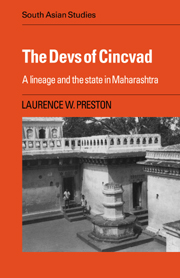Book contents
Introduction: an inamdar lineage in Indian history
Published online by Cambridge University Press: 05 November 2011
Summary
The opportunity afforded me of visiting the city of Poona, with the embassy of 1800, I eagerly embraced, to obtain information respecting an extraordinary family, which enjoys the distinction of an hereditary incarnation of the divinity, from father to son; and the following is the result of my researches.
So Captain Edward Moor begins the first English account of the Devs of Cincvad, a brahman lineage of Maharashtra that is the subject of this book. By any standard the Devs were unique and visit to Cincvad, a village some 15 kilometers north-west of the Maratha capital Pune (see Figure 1), was considered worthwhile. They were descended from Moroba Gosavi, a seventeenth-century saint famed in Maharashtra for his devotions to Ganesh, that ubiquitous elephant-headed deity so popular in western India. Like a hereditary office or dignity, the senior descendant of the saint was considered a manifestation of the deity; he was the Dev of Cincvad (the surname Dev meaning ‘god’.) The lineage was wealthy, having rights over many inām (‘rent-free’) villages near Pune, which encompassed some of the best lands in upland Maharashtra. In addition, the Devs coined their own rupees, collected duties from trade in and out of Pune, and received a variety of state allowances. Moreover, the political elite of the Maratha state – starting with the kings, descendants of Shivaji, and continuing under their powerful hereditary ministers, the Peshvas – held the Dev and his kin in great esteem.
- Type
- Chapter
- Information
- The Devs of CincvadA Lineage and the State in Maharashtra, pp. 1 - 20Publisher: Cambridge University PressPrint publication year: 1989



